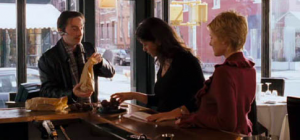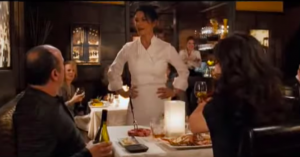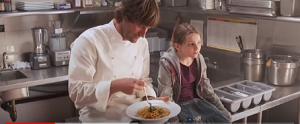Plot Summary Kate is an amazing chef at a Manhattan restaurant. She sent to therapy by the restaurant owner because she is unyielding and rule-bound, and does know when to take a break. Kate’s world is turned upside down when her only sister dies and her ten-year-old niece, Zoe, comes to live with her. As Kate struggles to be a parent to a grief-stricken child, the one stable thing in her life – the restaurant kitchen – is changed as her boss hires a a second chef. This chef is Nick who is Italian trained, loose, and fun. He completely changes the kitchen environment while she is gone. However, when she returns he claims it’s an honor to work in Kate’s kitchen but the Kate does not trust him and believes he wants her position. When Zoe gets close to Nick and invites him to have dinner with Kate and her, she changes her feelings for Nick. But when his work is recognized by the clients of the restaurant, Kate believes she committed a mistake (Hicks).
Themes
(Food and Identity, Food and Gender, Communication, Cuisine)
There are various forms of identity the forms of identity that show up in this film include; occupation, family and gender. Identity is a person’s sense of who they are based on their group membership. (Tajfel, 1979). During the movie Kates identity as head chef changes drastically throughout the film. She holds the idea in her head that everything must run smoothly and she must be in control at all times, her staff only verifies her thoughts as they run a very particular system while working in the kitchen.
Kates also has a very particular palette and only truly know how to prepare fancy upper-class meals. Cuisine is a theme that is very prominent throughout this movie as Kate at the very beginning describes how to perfectly cook a quail, or argues with a customer that their meal is cooked perfectly, insults her nieces mothers cooking and is hesitant to serve her niece fish sticks. Cuisine is focused around the ingredients, flavor principles and cooking techniques. All of which Kates is very specific about. She tastes each of her dishes multiple times, gets illegal truffles imported for her dishes, goes to the fish market at the crack of dawn each morning to get the best catch and even has the fisherman catch her specific things that she asks for, she knows how long and to what degree every meat in her kitchen should be cooked.

“But there’s no greater sin than to overcook a quail. Perfectly cooked, it must have a touch of pink on the breast. But you need the right quail. It has to be fleshy or it dries out too easily. I prefer to serve them roasted. That makes their taste richer and more robust. And a side of truffle ravioli and wild mushrooms… …goes deliciously well with them” (No Reservations Script)
“What about fish sticks? Kids love them. Fish sticks? Yeah, you know, they’re frozen and breaded- I know what fish sticks are. I just can’t believe I’m paying for these suggestions. Fish sticks.” (No Reservations Script)
“What am I supposed to do, force her? Maybe she misses her mother’s cooking. My sister never cooked. She reheated. Well, that’s the point. Maybe Zoe needs something more familiar, less sophisticated.” (No Reservations Script)
“No Reservations” also has something todo with how a woman “should” behave. In America it is perceived that women do most of the feeding in the U.S which includes preparing, serving, and planning meals for the family and out of all the food tasks the men are most often the ones to cook. Yet, Kate’s restaurant is owned by Paula, who hauls Kate out front to meet her “fans,” but wants her to stay in the kitchen when a customer complains. This is contrary to Kate’s nature. She doesn’t want to waste time glad-handing, but if anyone dares to complain about her pate, or her definition of “rare,” she storms out of the kitchen and soon the customer storms out of the restaurant.
We’ve heard about male chefs throwing tantrums, which is almost required of male chefs, but for Kate to behave in an unladylike manner threatens her job. The movie also goes against gender roles in the fact that Kate is he head chef in a male dominated profession and does not know how to care for a child like one would assume a woman does. She does not allow her emotions to guide her decisions and has a hard time relating to kids.
There is also the small underlying theme of the pressures of a chef which can be seen in Kate as she attempts to keep her meals and kitchen perfect, and gets extremely defensive whenever a person complains. It can also be seen in Kate as soon as Nick gets hired and she is afraid he will take her job. But, the pressures of a chef can also be seen in Nick as he struggles to work under Kate even though she does want him there in the beginning and as his training is questions and in the big moment where Kate asks him why he doesn’t have the guts to start his own kitchen on his own.
“Why didn’t you have the guts just to run your own kitchen, Nick? Instead of coming in here and taking over mine?” (No Reservations Script)
“Wait a minute, where are you going? I’m sorry, you’ll have to find someone else. – Kate, what have you done? – I didn’t do anything. Nick, please. We need you. Well, I’ll have to hear that from her. It’s my restaurant. It may be your restaurant, Paula, but it’s her kitchen. Without her… …all this would just be a pile of hot metal and dirty dishes, so… She decides.” (No Reservations Script)
“ I swear to god if you weren’t one of the better chefs in this city I’d fire you” (No Reservations Script)

Another theme present in the film is food as a form of communication. Kates food also presents a clean, controlled upper class status which does much appeal to her niece. Nick however, uses food to get closer to people, to make friends and to make people feel comfortable. This can be seen when Nick cooks lunch for the kitchen staff and attempts to get Kate to eat some, as well as when Nick lets Kate’s nieces chop basil in the kitchen and tempts her with spaghetti.

“Only a full chef can taste food, if you are hungry everything tastes better” (No Reservations Script)
My opinion
No reservations was a great movie, it leans more so to a romantic drama than a romantic comedy. The movie is filled with many needed themes and ideas such as the switch in gender roles, the adult learning from the child, the reality of a child who gets passed onto family, the pressures of a chef and many other elements. The movies is definitely extremely cliche at times but still worth the watch. This movie appeals to a variety of people including, women who cook, food show lovers, those who love fancy food, and romance enthusiasts. I think that without a character such as Nick the film would have been extremely predictable and not worth the watch. I do think that it would have been worth it to develop Kate and her sisters background because the interaction between the two was short brief and seemingly unrelated until half way through the movie. I also loved the fact that they started a restaurant together and her niece worked with them.
References
Hicks, S. (Director). (2007). No reservations. United States: Roadshow. Retrieved April 16, 2019.
Website on which the movie was watched did not give time stamps so all quotes were verified through the source below.
No Reservations Script – Dialogue Transcript. (n.d.). Retrieved from http://www.script-o-rama.com/movie_scripts/n/no-reservations-script-transcript.html
All images were screenshotted from the movie except for the featured image which was taken from the source below
No Reservations (2007). (n.d.). Retrieved from https://www.rottentomatoes.com/m/no_reservations